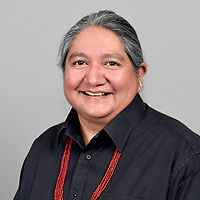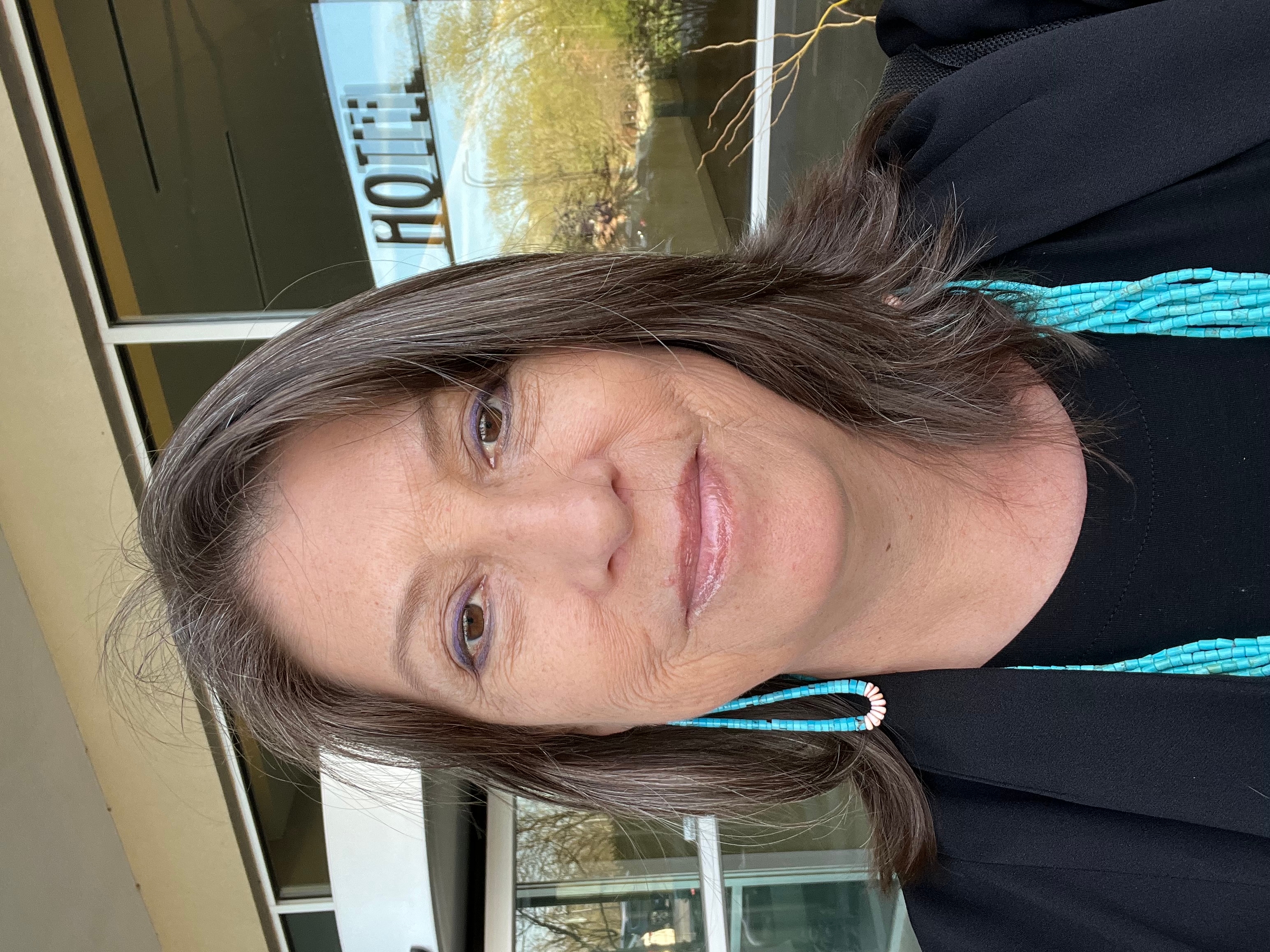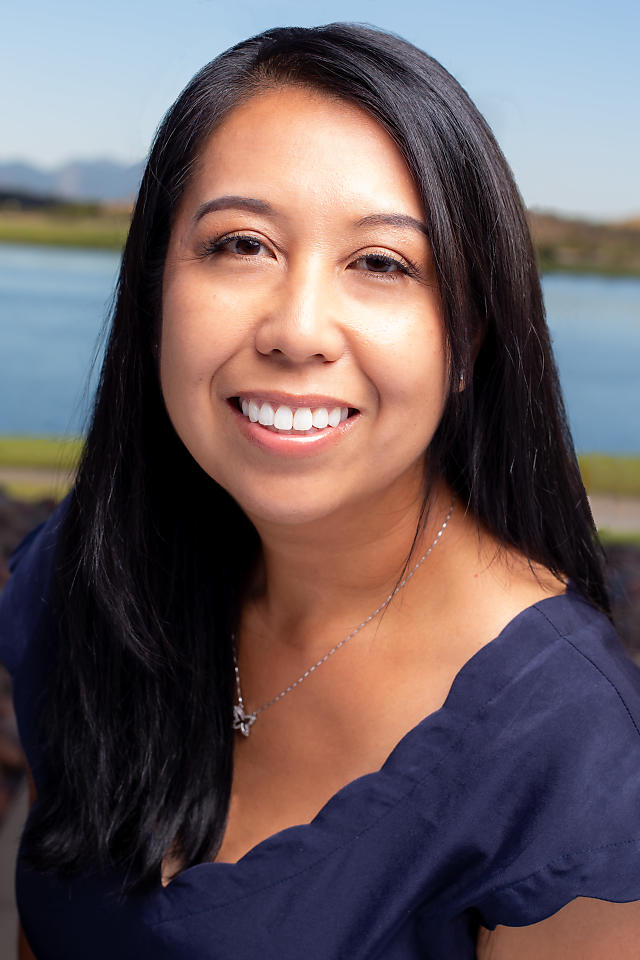NCP Team
 Damián Vergara Wilson is the Director of the Center for Regional Studies, a position he started in July, 2025. He is also Professor in the Department of Spanish and Portuguese where he previously directed the Spanish as a Heritage Language program, which aims to maintain and revitalize community varieties of the language in New Mexico. His scholarship focuses on language ideologies and sociolinguistics, especially when related to the teaching of heritage languages. One of the things that has shaped his approach to teaching, scholarship and his post as Director of CRS is his upbringing in Ojo Caliente, NM, a small but vibrant village in northern NM where he grew up speaking the unique dialect of Spanish found in this region.
Damián Vergara Wilson is the Director of the Center for Regional Studies, a position he started in July, 2025. He is also Professor in the Department of Spanish and Portuguese where he previously directed the Spanish as a Heritage Language program, which aims to maintain and revitalize community varieties of the language in New Mexico. His scholarship focuses on language ideologies and sociolinguistics, especially when related to the teaching of heritage languages. One of the things that has shaped his approach to teaching, scholarship and his post as Director of CRS is his upbringing in Ojo Caliente, NM, a small but vibrant village in northern NM where he grew up speaking the unique dialect of Spanish found in this region.  Myla Vicenti Carpio, Ph.D. is a citizen of the Jicarilla Apache Nation and is of Laguna and Isleta Pueblo heritage. She is an Associate Professor in Native American Studies at the University of New Mexico.
Myla Vicenti Carpio, Ph.D. is a citizen of the Jicarilla Apache Nation and is of Laguna and Isleta Pueblo heritage. She is an Associate Professor in Native American Studies at the University of New Mexico. Vicenti Carpio’s first book Indigenous Albuquerque was published in 2011. She is currently working on a co-authored manuscript with Dr. Karen J. Leong. Their manuscript American Movements: Understanding the Ideological and Institutional Reasoning for Japanese American and American Indian Relocations, 1940-1970, which examines the institutional histories of Japanese relocation and urban Indian relocation and chronicles the development of a federal strategy of relocating racially marginalized communities with the intent of facilitating their assimilation into American values and society. Vicenti Carpio with Dr. Jeffrey Shepherd is co-editor of the Critical Issues in Indigenous Studies Book Series with the University of Arizona Press.
Myla Vicenti Carpio has also published on historical memory, urban/nonreservation experience, and sterilization of American Indian women and has presented her research in the U.S. and abroad. Her research areas include Indigenous history, urban issues, gender and sexuality, decolonization and food sovereignty.
 Wendy S. Greyeyes, Ph.D. (Diné) is an Associate Professor of Native American Studies at the University of New Mexico. Tódích’íinii nishłí, tódích’íinii báshshíshchíín, tł’ízíłani dashicheii, tó’ahání dashinálí. Tódínéeshzhee’ déé’ naashá. Dr. Greyeyes is a former Nits’áá dóó ídahwiil’aah “ We Are Learning From You” Fellows Program at Diné College, funded by the Mellon Foundation. Dr. Greyeyes formerly worked for the Arizona Governor as a Tribal Liaison for the Arizona Teacher Excellence Program and Homeland Security, a Grassroots Manager for the Indian Self Reliance Initiative in Arizona, a Statistician/Demographer for the Department of Diné Education, a Program Analyst/Chief Implementation Officer for the Bureau of Indian Education, and a research consultant with the Department of Diné Education. She currently is the former chair for the New Mexico Indian Education Advisory Council (IEAC), former President of the Diné Studies Conference, Inc., former President of the American Indian Studies Association (AISA), and faculty advisor for the Kiva Club. Dr. Greyeyes received her M.A. and Ph.D. in Sociology from the University of Chicago and B.A. in Native American Studies from Stanford University. Her research is focused on political sociology, organizational analysis, Indigenous education, tribal sovereignty, and Nation Building. Recent publications include her book titled A History of Navajo Education: Disentangling our Sovereign Body (2022) and The Yazzie Case: Building a Public Education System for Our Indigenous Future (2023), edited by Wendy S. Greyeyes, Lloyd L. Lee and Glenabah Michelle Martinez.
Wendy S. Greyeyes, Ph.D. (Diné) is an Associate Professor of Native American Studies at the University of New Mexico. Tódích’íinii nishłí, tódích’íinii báshshíshchíín, tł’ízíłani dashicheii, tó’ahání dashinálí. Tódínéeshzhee’ déé’ naashá. Dr. Greyeyes is a former Nits’áá dóó ídahwiil’aah “ We Are Learning From You” Fellows Program at Diné College, funded by the Mellon Foundation. Dr. Greyeyes formerly worked for the Arizona Governor as a Tribal Liaison for the Arizona Teacher Excellence Program and Homeland Security, a Grassroots Manager for the Indian Self Reliance Initiative in Arizona, a Statistician/Demographer for the Department of Diné Education, a Program Analyst/Chief Implementation Officer for the Bureau of Indian Education, and a research consultant with the Department of Diné Education. She currently is the former chair for the New Mexico Indian Education Advisory Council (IEAC), former President of the Diné Studies Conference, Inc., former President of the American Indian Studies Association (AISA), and faculty advisor for the Kiva Club. Dr. Greyeyes received her M.A. and Ph.D. in Sociology from the University of Chicago and B.A. in Native American Studies from Stanford University. Her research is focused on political sociology, organizational analysis, Indigenous education, tribal sovereignty, and Nation Building. Recent publications include her book titled A History of Navajo Education: Disentangling our Sovereign Body (2022) and The Yazzie Case: Building a Public Education System for Our Indigenous Future (2023), edited by Wendy S. Greyeyes, Lloyd L. Lee and Glenabah Michelle Martinez.  Lloyd L. Lee, Ph.D. is an enrolled citizen of the Navajo Nation. He is Kiyaa’anii (Towering House people), born for Tl’ááschíí (Red Cheeks people). His maternal grandfather’s clan is Á shííhí (Salt clan), and his paternal grandfather’s clan is Tá bááhá (Water’s Edge people).
Lloyd L. Lee, Ph.D. is an enrolled citizen of the Navajo Nation. He is Kiyaa’anii (Towering House people), born for Tl’ááschíí (Red Cheeks people). His maternal grandfather’s clan is Á shííhí (Salt clan), and his paternal grandfather’s clan is Tá bááhá (Water’s Edge people).
He is Professor and Chair in the Department of Native American Studies at the University of New Mexico (UNM) and editor of the Wicazo Sa Review journal. He is the author of Diné Identity in a 21st Century World (2020), Diné Masculinities: Conceptualizations and Reflections (2013), co-author of Native Americans and the University of New Mexico (2017), co-edited The Yazzie Case: Building a Public Education System for Our Indigenous Future (2023), and edited Nihikéyah: Navajo Homeland (2023), Navajo Sovereignty: Understandings and Visions of the Diné People (2017) and Diné Perspectives: Reclaiming and Revitalizing Navajo Thought (2014). His research focuses on Indigenous identity, masculinities, leadership, philosophies, and Native Nation building/Indigenous community building.  Tiffany S. Lee, Ph.D. is Dibé Łizhiní (Blacksheep) Diné from Crystal, New Mexico, and Oglala Lakota from Pine Ridge, South Dakota. Dr. Lee is a Distinguished Professor in Native American Studies at the University of New Mexico in Albuquerque. Her research examines educational and culturally-based outcomes of Indigenous language immersion schools, the relationship of Diné language learning to wellbeing, and Native youth perspectives on language reclamation, and socio-culturally centered education. Her work has been published in journals, such as the American Journal of Education, Harvard Educational Review, the Journals of Language, Identity, and Education and American Indian Education; and in books, such as Culturally Sustaining Pedagogies: Teaching and Learning for Justice in a Changing World, The Yazzie Case: Building a Public Education System for our Indigenous Future, and Indigenous language revitalization in the Americas. She is a former high school social studies and language arts teacher at schools on the Navajo Nation and at Santa Fe Indian School. She is currently collaborating with colleagues on a recently opened Diné language nest in Albuquerque and to prepare Diné language immersion educators through the Diné Language Teacher Institute.
Tiffany S. Lee, Ph.D. is Dibé Łizhiní (Blacksheep) Diné from Crystal, New Mexico, and Oglala Lakota from Pine Ridge, South Dakota. Dr. Lee is a Distinguished Professor in Native American Studies at the University of New Mexico in Albuquerque. Her research examines educational and culturally-based outcomes of Indigenous language immersion schools, the relationship of Diné language learning to wellbeing, and Native youth perspectives on language reclamation, and socio-culturally centered education. Her work has been published in journals, such as the American Journal of Education, Harvard Educational Review, the Journals of Language, Identity, and Education and American Indian Education; and in books, such as Culturally Sustaining Pedagogies: Teaching and Learning for Justice in a Changing World, The Yazzie Case: Building a Public Education System for our Indigenous Future, and Indigenous language revitalization in the Americas. She is a former high school social studies and language arts teacher at schools on the Navajo Nation and at Santa Fe Indian School. She is currently collaborating with colleagues on a recently opened Diné language nest in Albuquerque and to prepare Diné language immersion educators through the Diné Language Teacher Institute.  Natalie Martinez, Ph.D. (K’awaika-meh, Laguna Pueblo) is a professional educator. She was a principal and teacher at her Pueblo Nation; she taught middle schoolers and high schoolers in New Mexico. Dr. Martinez’s collaborations on Indigenous-centered curriculum projects include: Indigenous Wisdom;Indigenous New Mexico; the curriculum guides: An Indigenous Peoples' History of the United States for Young People; Indigenous Ingenuity; and Wings of an Eagle: The Gold Medal Dreams of Billy Mills. Her chapters appear in Luminous Literacies and The Yazzie Case: Interrogating the Yazzie/Martinez Lawsuit. She has written and interviewed for the International Journal for Adolescent and Adult Literacy. Additionally, her teacher professional development work with the OER Project is available online. Since 2019, Dr. Martinez completed a Visiting Lecturer appointment at the University of New Mexico and a full-time faculty post at Central NM Community College. She is currently serving as an Assistant Professor at New Mexico State University.
Natalie Martinez, Ph.D. (K’awaika-meh, Laguna Pueblo) is a professional educator. She was a principal and teacher at her Pueblo Nation; she taught middle schoolers and high schoolers in New Mexico. Dr. Martinez’s collaborations on Indigenous-centered curriculum projects include: Indigenous Wisdom;Indigenous New Mexico; the curriculum guides: An Indigenous Peoples' History of the United States for Young People; Indigenous Ingenuity; and Wings of an Eagle: The Gold Medal Dreams of Billy Mills. Her chapters appear in Luminous Literacies and The Yazzie Case: Interrogating the Yazzie/Martinez Lawsuit. She has written and interviewed for the International Journal for Adolescent and Adult Literacy. Additionally, her teacher professional development work with the OER Project is available online. Since 2019, Dr. Martinez completed a Visiting Lecturer appointment at the University of New Mexico and a full-time faculty post at Central NM Community College. She is currently serving as an Assistant Professor at New Mexico State University.  Leola Tsinnajinnie Paquin, Ph.D. [Diné/Filipina & traditionally accepted into Santa Ana Pueblo] is an Associate Professor at the University of New Mexico (UNM) in Native American Studies. Her research and service activities focus on Indigenous educational sovereignty and wellbeing. She is a member of the UNM Diversity Council Curriculum Subcommittee and the Institute for American Indian Education (IAIE). She has been an Expanding Course-Based Undergraduate Research Experience Faculty Fellow, Student Experience Project Fellow and an Academic Affairs General Education Faculty Fellow on Race and Social Justice. Beyond UNM, she has also served as President of the American Indian Studies Association Council. Her board membership has included the New Mexico American Civil Liberties Union and the Torreon Community Alliance. Dr. Paquin’s published work includes article contributions to the Wicazo Sa Review and Journal of the West. Her chapter contributions include the books: The Yazzie Case: Interrogating the Martinez/Yazzie v. New Mexico Lawsuit; Indigenous Motherhood in the Academy; and Indigenous Health and Justice. She has collaborated with numerous school districts and colleges in New Mexico. Through her various community-based partnerships, she creates curriculum and gray literature to support the growth of Indigenous platforms. She is a joyful member of the Running Medicine movement community which centers the intersection of her academic identities and family roles. Thus, she enjoys mentoring students with Indigenous wellbeing initiatives and research agendas. She has been an active faculty mentor in the El Puente Research Fellowship, Arts & Sciences Support for Undergraduate Research Experience Fellowship, and in the Graduate College’s Faculty Mentoring Program.
Leola Tsinnajinnie Paquin, Ph.D. [Diné/Filipina & traditionally accepted into Santa Ana Pueblo] is an Associate Professor at the University of New Mexico (UNM) in Native American Studies. Her research and service activities focus on Indigenous educational sovereignty and wellbeing. She is a member of the UNM Diversity Council Curriculum Subcommittee and the Institute for American Indian Education (IAIE). She has been an Expanding Course-Based Undergraduate Research Experience Faculty Fellow, Student Experience Project Fellow and an Academic Affairs General Education Faculty Fellow on Race and Social Justice. Beyond UNM, she has also served as President of the American Indian Studies Association Council. Her board membership has included the New Mexico American Civil Liberties Union and the Torreon Community Alliance. Dr. Paquin’s published work includes article contributions to the Wicazo Sa Review and Journal of the West. Her chapter contributions include the books: The Yazzie Case: Interrogating the Martinez/Yazzie v. New Mexico Lawsuit; Indigenous Motherhood in the Academy; and Indigenous Health and Justice. She has collaborated with numerous school districts and colleges in New Mexico. Through her various community-based partnerships, she creates curriculum and gray literature to support the growth of Indigenous platforms. She is a joyful member of the Running Medicine movement community which centers the intersection of her academic identities and family roles. Thus, she enjoys mentoring students with Indigenous wellbeing initiatives and research agendas. She has been an active faculty mentor in the El Puente Research Fellowship, Arts & Sciences Support for Undergraduate Research Experience Fellowship, and in the Graduate College’s Faculty Mentoring Program.  Renata Yazzie, Tó’aheedlíinii born for Kinyaa’áanii, is a Diné (Navajo) pianist, musicologist, and writer based in New York City. She is currently a PhD Student in Ethnomusicology at Columbia University and also holds a bachelor’s degree in Chemistry and a master’s degree in Music with dual concentrations in Musicology and Piano Performance from the University of New Mexico. Her research interests span across genres within Indigenous music and also cross into linguistic, pedagogical, and theological inquiry. Yazzie is the current host of American Classical Voices, a radio show on Classical 95.5 KHFM, dedicated to showcasing the sounds and stories of Native composers. She is also the founder of the American Indian Musicians’ Scholarship which seeks to provide well-rounded support to American Indian students pursuing a post-secondary degree in Music.
Renata Yazzie, Tó’aheedlíinii born for Kinyaa’áanii, is a Diné (Navajo) pianist, musicologist, and writer based in New York City. She is currently a PhD Student in Ethnomusicology at Columbia University and also holds a bachelor’s degree in Chemistry and a master’s degree in Music with dual concentrations in Musicology and Piano Performance from the University of New Mexico. Her research interests span across genres within Indigenous music and also cross into linguistic, pedagogical, and theological inquiry. Yazzie is the current host of American Classical Voices, a radio show on Classical 95.5 KHFM, dedicated to showcasing the sounds and stories of Native composers. She is also the founder of the American Indian Musicians’ Scholarship which seeks to provide well-rounded support to American Indian students pursuing a post-secondary degree in Music.  Aracely "Arcie" Chapa is an accomplished broadcast journalist and documentary filmmaker. She was the host and executive producer of the KNME weekly public affairs show “In Focus”, as well as the KUNM “Call-In Show”. She has produced countless award-winning films, including her most recent, the highly acclaimed, Acequias: The Legacy Lives On, and a trilogy of Emmy nominated films commemorating UNM’s colorful history and significant anniversary milestones, titled Zimmerman@75,UNM@125 and Popejoy@50. “Aracely has over 30 years’ experience in broadcast journalism, holding positions as anchor, reporter, news director, senior producer and executive producer of documentary films. She has won several awards including the prestigious National Press Club award for investigative reporting and five Emmy awards for documentary filmmaking. She is currently the Manager of Multi-Media Services at the Center for Regional Studies.
Aracely "Arcie" Chapa is an accomplished broadcast journalist and documentary filmmaker. She was the host and executive producer of the KNME weekly public affairs show “In Focus”, as well as the KUNM “Call-In Show”. She has produced countless award-winning films, including her most recent, the highly acclaimed, Acequias: The Legacy Lives On, and a trilogy of Emmy nominated films commemorating UNM’s colorful history and significant anniversary milestones, titled Zimmerman@75,UNM@125 and Popejoy@50. “Aracely has over 30 years’ experience in broadcast journalism, holding positions as anchor, reporter, news director, senior producer and executive producer of documentary films. She has won several awards including the prestigious National Press Club award for investigative reporting and five Emmy awards for documentary filmmaking. She is currently the Manager of Multi-Media Services at the Center for Regional Studies.  After working as a third-party pension plan administrator, Alisha Fitzgerald became a homeschool teacher and a freelance writing tutor. She currently works as Program Coordinator for the Center for Regional Studies at UNM with degrees in Marketing and Office Technology. Outside of work, Alisha spends time as a Krav Maga student and instructor who co-teaches women’s self-defense classes and is part of a team that delivers active shooter survival training to schools, offices, and churches.
After working as a third-party pension plan administrator, Alisha Fitzgerald became a homeschool teacher and a freelance writing tutor. She currently works as Program Coordinator for the Center for Regional Studies at UNM with degrees in Marketing and Office Technology. Outside of work, Alisha spends time as a Krav Maga student and instructor who co-teaches women’s self-defense classes and is part of a team that delivers active shooter survival training to schools, offices, and churches.  Jennifer Black is Korean, White, and Mexican. She's an independent filmmaker and multi-media storyteller who founded a nonprofit whose focus is to engage Navajo youth in filmmaking through culturally relevant outdoor education and horsemanship. When she isn't outdoors or behind a camera, Jennifer can be found inside, writing at her computer. She debuted as a professional writer in Ellery Queen Mystery Magazine's Department of First Stories. Her favorite activity outside of work is doing anything with her horse, especially if it's mounted archery that's bareback and bridleless.
Jennifer Black is Korean, White, and Mexican. She's an independent filmmaker and multi-media storyteller who founded a nonprofit whose focus is to engage Navajo youth in filmmaking through culturally relevant outdoor education and horsemanship. When she isn't outdoors or behind a camera, Jennifer can be found inside, writing at her computer. She debuted as a professional writer in Ellery Queen Mystery Magazine's Department of First Stories. Her favorite activity outside of work is doing anything with her horse, especially if it's mounted archery that's bareback and bridleless.
